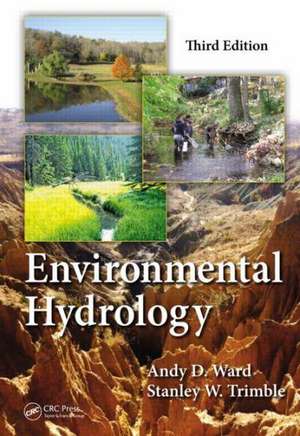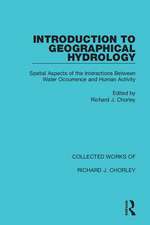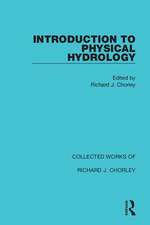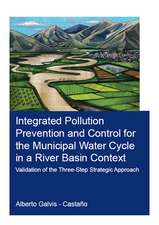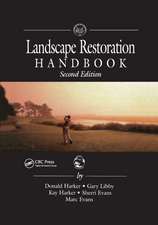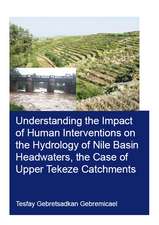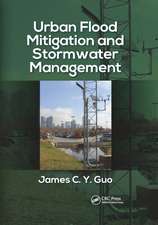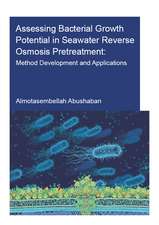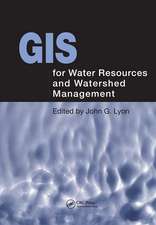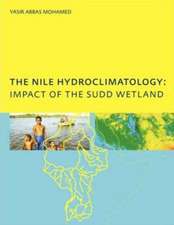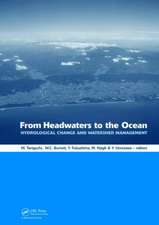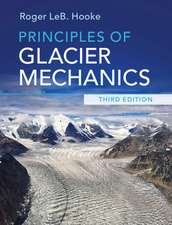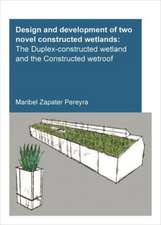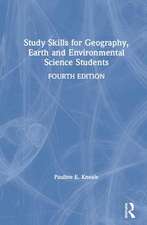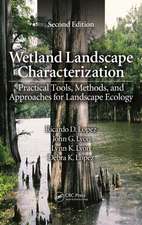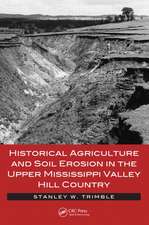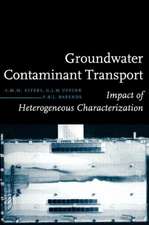Environmental Hydrology
Autor Andy D. Ward, Stanley W. Trimble, Suzette R. Burckhard, John G. Lyonen Limba Engleză Hardback – 17 sep 2015
The first and second editions were bestsellers and the third promises to educate people new to the field of hydrology and challenge professionals alike, with insightful solutions to classical problems as well as trendsetting approaches important to the evolving genre. The third edition enhances materials in the second edition and has expanded information on many topics, in particular, evapotranspiration, soil erosion, two-stage ditch design and applications, and stream processes.
What’s New in the Third Edition:
- Presents new sections on rock structures in streams, hypoxia, harmful algal blooms, and agricultural practices to reduce nutrient discharges into water resources
- Enhances the format to aid the reader in finding tables, figures, and equations
- Contains more than 370 figures, 120 tables, 260 equations, 100 worked examples, 160 problems, and more than 1000 references
Preț: 1052.04 lei
Preț vechi: 1223.30 lei
-14% Nou
Puncte Express: 1578
Preț estimativ în valută:
201.33€ • 207.99$ • 167.56£
201.33€ • 207.99$ • 167.56£
Carte disponibilă
Livrare economică 04-18 martie
Preluare comenzi: 021 569.72.76
Specificații
ISBN-13: 9781466589414
ISBN-10: 1466589418
Pagini: 696
Ilustrații: 452 black & white illustrations, 123 black & white tables
Dimensiuni: 216 x 280 x 46 mm
Greutate: 2.1 kg
Ediția:Revizuită
Editura: CRC Press
Colecția CRC Press
Locul publicării:Boca Raton, United States
ISBN-10: 1466589418
Pagini: 696
Ilustrații: 452 black & white illustrations, 123 black & white tables
Dimensiuni: 216 x 280 x 46 mm
Greutate: 2.1 kg
Ediția:Revizuită
Editura: CRC Press
Colecția CRC Press
Locul publicării:Boca Raton, United States
Cuprins
The Hydrologic Cycle, Water Resources, and Society. Precipitation. Infiltration and Soil Water Processes. Evapotranspiration. Runoff and Drainage. Stream Processes. Uniform Open Channel Flow. Hydraulic Control Structures. Soil Conservation and Sediment Budgets. Hydrology of Forests, Wetlands, and Cold Climates. Hydrogeology. Human Impacts on Water Resources: Prevention and Treatment Strategies. Fundamentals of Remote Sensing and Geographic Information Systems for Hydrologic. Applications. Practical Exercises on Conducting and Reporting Hydrologic Studies. References. Appendices. Index.
Notă biografică
Andy D. Ward, Ph.D, is a professor in the Department of Food, Agricultural and Biological Engineering, The Ohio State University and has been a member of the faculty since 1986. In 1971, he obtained a B.Sc. in civil engineering from Imperial College, London, England. In 1977 and 1981, Dr. Ward obtained an M.S. and Ph.D. respectively in agricultural engineering from the University of Kentucky. He has authored more than 100 manuscripts and co-authored a paper that received the 1994 Autometric Award from the American Society of Photogrammetry and Remote Sensing for the best interpretation of remote sensing data.
Stanley W. Trimble, Ph.D, is professor emeritus in the Department of Geography at UCLA and has been a member of the faculty since 1975. In 1963, he received a B.S. in chemistry from the University of North Alabama. He earned his M.A. (1970) and Ph.D. (1973) in geography at the University of Georgia. Dr .Trimble was a research hydrologist with the US Geological Survey from 1973-84, and a visiting professor at the Universities of Chicago (1978, 1981, 1990), Vienna (1994, 1999), Oxford (1995), London (University College, 1985), and Durham (1998). He has published more than 100 research publications.
Suzette R. Burckhard, PhD, PE is a professor in the Civil and Environmental Engineering Department in the Jerome J. Lohr College of Engineering at South Dakota State University (SDSU), Brookings. She has been on the faculty since 1997. Dr. Burckhard earned a BS in engineering physics and civil engineering from SDSU. She also attended Kansas State University, earning an MS in physics, an MS in chemical engineering, and a PhD in civil engineering while there. She has over 100 presentations and publications including coauthoring the 3rd place ESRI Award for Best Scientific Paper in Geographic Information Systems in 2008.
John G. Lyon has conducted scientific and engineering research and administrative functions throughout his career. He is formerly the senior physical scientist in the U.S. Environmental Protection Agency’s Office of Research and Development (ORD) and Office of the Science Advisor in Washington, DC, where he co-led work on the Group on Earth Observations and the USGEO subcommittee of the Committee on Environment and Natural Resources, and research on geospatial issues. Lyon was director of ORD’s Environmental Sciences Division for approximately eight years. He was educated at Reed College in Portland, Oregon, and the University of Michigan in Ann Arbor.
Stanley W. Trimble, Ph.D, is professor emeritus in the Department of Geography at UCLA and has been a member of the faculty since 1975. In 1963, he received a B.S. in chemistry from the University of North Alabama. He earned his M.A. (1970) and Ph.D. (1973) in geography at the University of Georgia. Dr .Trimble was a research hydrologist with the US Geological Survey from 1973-84, and a visiting professor at the Universities of Chicago (1978, 1981, 1990), Vienna (1994, 1999), Oxford (1995), London (University College, 1985), and Durham (1998). He has published more than 100 research publications.
Suzette R. Burckhard, PhD, PE is a professor in the Civil and Environmental Engineering Department in the Jerome J. Lohr College of Engineering at South Dakota State University (SDSU), Brookings. She has been on the faculty since 1997. Dr. Burckhard earned a BS in engineering physics and civil engineering from SDSU. She also attended Kansas State University, earning an MS in physics, an MS in chemical engineering, and a PhD in civil engineering while there. She has over 100 presentations and publications including coauthoring the 3rd place ESRI Award for Best Scientific Paper in Geographic Information Systems in 2008.
John G. Lyon has conducted scientific and engineering research and administrative functions throughout his career. He is formerly the senior physical scientist in the U.S. Environmental Protection Agency’s Office of Research and Development (ORD) and Office of the Science Advisor in Washington, DC, where he co-led work on the Group on Earth Observations and the USGEO subcommittee of the Committee on Environment and Natural Resources, and research on geospatial issues. Lyon was director of ORD’s Environmental Sciences Division for approximately eight years. He was educated at Reed College in Portland, Oregon, and the University of Michigan in Ann Arbor.
Recenzii
"Environmental Hydrology provides a helpful introduction to some of the key processes and issues surrounding contemporary hydrology, from the description of the main components of the hydrological cycle, to human impacts and the application of remote sensing and GIS. A dedicated chapter at the end of the book that contains practical exercises provides readers with the opportunity to test their understanding of the book’s content."
—Dr Simon Gosling, School of Geography, University of Nottingham, UK
"This is an updated edition (2nd ed., 2004; 1st ed., 1995) of a comprehensive introductory hydrology textbook. At over 600 pages, it covers a lot of territory. This is perhaps appropriate for a subject as broad as the water molecule, but the text’s sheer size might be daunting to some. The presentation and mathematical explanations are clear, and there are quite a few worked examples and end-of-chapter problems which are logically posed. The volume takes a more broad-scale look at hydrological science than comparable works, such as S. L. Dingman's Physical Hydrology (3rd ed., 2014). Some derivations appear slightly more general than in Dingman's text, for example, in the presentation of the Penman-Monteith equation, but Ward (Ohio State) and coauthors then add pertinent material from diverse specialties. This is appropriate as hydrology can be seen as a major interdisciplinary factor linking many branches of earth and environmental science. Chapters on the fundamental physical processes behind the basic water balance equation are followed by relatively in-depth discussions of hydrological analysis as applied, for example, to specific ecosystems such as forests and high latitude regions. Next, the authors provide substantial material on such varied topics as sedimentation, human impacts, geographic information systems (GIS), and remote sensing as they are applied to hydrology."
—CHOICE, May 2016
"Unlike many other hydrology textbooks, the authors of Environmental Hydrology make an exceptional effort of emphasize water in soil, agricultural soil and land management, and even the use of soil surveys in several of the chapters while integrating classical hydrology concepts."
—Soil Science Society of America Journal, April 2016
"Environmental Hydrology is full of useful information presented in both written and visual formats. Even in black and white, photos and figures are helpful in conveying important points to the reader. The book is packed with examples and problems drawn from the authors’ professional experiences as practicing engineers and hydrologists. From an educator’s perspective, the book has a nice balance between examples and problems that are straight-forward in their solution and those that require the student to make assumptions and exercise sound professional judgment, as in many "real-world" cases where not all of the inputs are given or known."
—Groundwater, September-October 2016
—Dr Simon Gosling, School of Geography, University of Nottingham, UK
"This is an updated edition (2nd ed., 2004; 1st ed., 1995) of a comprehensive introductory hydrology textbook. At over 600 pages, it covers a lot of territory. This is perhaps appropriate for a subject as broad as the water molecule, but the text’s sheer size might be daunting to some. The presentation and mathematical explanations are clear, and there are quite a few worked examples and end-of-chapter problems which are logically posed. The volume takes a more broad-scale look at hydrological science than comparable works, such as S. L. Dingman's Physical Hydrology (3rd ed., 2014). Some derivations appear slightly more general than in Dingman's text, for example, in the presentation of the Penman-Monteith equation, but Ward (Ohio State) and coauthors then add pertinent material from diverse specialties. This is appropriate as hydrology can be seen as a major interdisciplinary factor linking many branches of earth and environmental science. Chapters on the fundamental physical processes behind the basic water balance equation are followed by relatively in-depth discussions of hydrological analysis as applied, for example, to specific ecosystems such as forests and high latitude regions. Next, the authors provide substantial material on such varied topics as sedimentation, human impacts, geographic information systems (GIS), and remote sensing as they are applied to hydrology."
—CHOICE, May 2016
"Unlike many other hydrology textbooks, the authors of Environmental Hydrology make an exceptional effort of emphasize water in soil, agricultural soil and land management, and even the use of soil surveys in several of the chapters while integrating classical hydrology concepts."
—Soil Science Society of America Journal, April 2016
"Environmental Hydrology is full of useful information presented in both written and visual formats. Even in black and white, photos and figures are helpful in conveying important points to the reader. The book is packed with examples and problems drawn from the authors’ professional experiences as practicing engineers and hydrologists. From an educator’s perspective, the book has a nice balance between examples and problems that are straight-forward in their solution and those that require the student to make assumptions and exercise sound professional judgment, as in many "real-world" cases where not all of the inputs are given or known."
—Groundwater, September-October 2016
Descriere
This new edition promises to educate those new to hydrology and challenge professionals alike with insightful solutions to classical problems as well as new approaches so important to the evolving genre. It enhances materials in the 2nd Edition and has expanded information on many topics and in particular evapotranspiration, soil erosion, two-stage ditch design and applications, and stream processes. There are new sections on rock structures in streams, hypoxia, harmful algal blooms, agricultural practices to reduce nutrient discharges into water resources, as well as new end-of-chapter problems. Also, the format has been enhanced to aid the reader in finding tables, figures, and equations.
